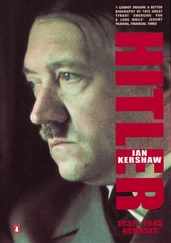Speer’s standing with Hitler had also weakened. Not only was he no longer so obviously Hitler’s favourite; he had to struggle against the increased influence of his own ambitious subordinate, Karl Otto Saur, head of the technical office in Speer’s ministry who earlier in the year had been placed by Hitler in charge of air defence. It would be as well, nevertheless, not to interpret Speer’s relative loss of power in the top echelons of the regime—which the former Armaments Minister was keen to emphasize for posterity—as meaning that he had been ousted from all significant spheres of influence. He continued, in fact, to occupy a decisive position at the intersection between the military and industry. The military needed the weaponry he made available. Industry needed his driving force to produce the weapons, in the face of severe and mounting difficulties. No amount of propaganda or repression by the Party’s populists and enforcers could supply the army with weapons.
On 1 August Speer was, moreover, able to extend his already sprawling empire when Göring was compelled to hand over to him control of the Luftwaffe’s armaments production. 87Whatever the internal struggles he had to undertake in the power jungle of the Third Reich during the phase of its inexorable decline, Speer remained indispensable to Hitler and the regime. Writing to Hitler near the end of the war, he claimed: ‘Without my work the war would perhaps have been lost in 1942–3.’ 88He was surely right. His achievements constitute an important element in the answer to the question of how Germany held out so long. 89To this extent, Speer, notwithstanding a weakening of his internal position, was a crucial—possibly even the most important—member of the quadrumvirate that directed Germany’s path into the abyss in the Third Reich’s last months.
The combined efforts of the quadrumvirate would have served little purpose had the armed forces shown signs of disaffection and wavered in their backing for the regime. We already saw, however, that, amid the shocked response at Stauffenberg’s assassination attempt, military leaders were keener than ever to demonstrate their loyalty to Hitler and dissociate themselves from the uprising against the regime. The arch-loyalist Jodl, his head bandaged after being slightly wounded in the bomb blast and in deep shock at what had happened, set the tone. He told Goebbels that the loyal generals who worked closely with Hitler would help him ‘ruthlessly hunt down the defeatists, putschists and assassination instigators’. 90So outraged was he at the ‘treachery’ from within that he favoured disbanding the General Staff altogether. 91‘The 20th of July’, he told officers of the Wehrmacht Operations Staff, was the ‘blackest day in German history’, worse even than 9 November 1918, ‘unique in its monstrosity’. Now there would be pitiless reprisals against those reponsible. When ‘everything rotten has been weeded out’, there would be a new unity. ‘Even if luck should be against us, we must be determined to gather round the Führer at the last, so that we may be justified before posterity.’ 92Jodl sought a personal show of loyalty from the officers present who were to seal their commitment to sharing their destiny with the Führer by a handshake. 93
Fear of any connection with the plotters, and the dire consequences such a discovery would entail, naturally played a significant part in the new rush to demonstrate loyalty beyond question. But the support for Hitler and denunciation of treachery by the army against their supreme commander and head of state was for the most part spontaneous and genuine. Even so, Hitler and the regime leadership were leaving nothing to chance. The upsurge of bile vented at the officer corps by Party fanatics, which Bormann even had to dampen down, now offered the perfect atmosphere in which new controls could be introduced and new efforts made to improve the ideological indoctrination of the army. The introduction (initiated by the commanders-in-chief of the armed forces, not by Hitler) on 23 July of the ‘Heil Hitler’ greeting instead of the military salute provided an external sign of the reinforced bonds with the Führer. 94
Hitler’s immediate step, within hours of the assassination attempt, was to restore order in what he had regarded, long before the plot, as the army’s most critical weak spot. For three weeks since Zeitzler’s breakdown at the beginning of July the army had in effect lacked a Chief of the General Staff. With the imminent danger of the Red Army breaking through into East Prussia, a new chief was a vital necessity. And since, in Hitler’s eyes, the source of the cancer that had led to the attempted uprising lay in this key centre of army operational planning, a reliable new chief was essential to make the General Staff both militarily effective and politically sound. Hitler’s intended choice, General Walter Buhle, had been injured in the assassination attempt. He turned, therefore, to the highly experienced and well-respected tank specialist Heinz Guderian, since early 1943 Inspector-General of Panzer Troops. A fervent nationalist and anti-Communist, a personality of great drive and dynamism, extremely forceful in his views, and a daring strategist, Guderian had played a notable part in persuading Hitler, whom in earlier years he had greatly admired, of the tactical value in modern warfare of concentrated and swift panzer attack. He had gained plaudits for the great panzer thrust through the Ardennes in 1940 that had played a major part in the spectacular collapse of Allied forces in France. A year later, his panzer forces had spearheaded the initially notable advances in Russia. Conflict with the Commander-in-Chief of Army Group Centre, Field-Marshal Hans Günther von Kluge, over tactics, and Guderian’s fiery temperament had brought his dismissal in the winter crisis of 1941, but he had been recalled by Hitler in February 1943, in the wake of another crisis, the catastrophe at Stalingrad. Though increasingly sceptical about Hitler’s conduct of the war, and despite being approached by the conspirators, Guderian had the following year kept his hands clean in the plot, and still condemned Stauffenberg’s attempt after the war. He certainly had Goebbels’ imprimatur. The Propaganda Minister described him as ‘insurpassable in loyalty to the Führer’. 95In his dealings with Hitler, Guderian would learn in the months to come that loyalty and sound military judgement seldom went hand in hand. But following his appointment on 21 July, he was keen to display his credentials as a loyalist and establish unconditional loyalty in an almost entirely reconstructed General Staff, which had seen so many of its former officers arrested under suspicion of complicity in the plot. He rapidly denounced what he depicted as the defeatism and cowardice that had led to the disgrace of the General Staff, and guaranteed an officer corps now completely loyal to the Führer. One of the early steps he took was to ensure that not merely the high level of ability associated with the General Staff, the ‘intellectual elite’ of the army, but ideological commitment to Nazi ideals was now required. On 29 July he issued the order that every General Staff officer should be a National Socialist Leadership Officer ( Nationalsozialistischer Führungsoffizier , NSFO), that ‘he must demonstrate and prove, as well as in tactics and strategy, through an exemplary stance in political questions, through active direction and instruction of younger comrades in the intentions of the Führer, that he belongs to the “selection of the best”’. 96The General Staff, having failed disastrously and criminally in the eyes of the regime’s leaders, was now particularly exposed to Nazification. No further disaffection could be expected from that quarter.
Читать дальше












